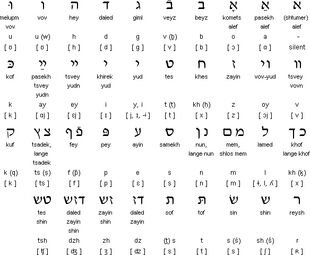| Spoken by: | 3 million |
|---|---|
| Spoken in: | non-territorial |
| Language family: | Germanic |
ייִדיש yidish or אידיש idish, literally "Jewish". It is spoken in Israel and other Jewish communities.
Yiddish is a West Germanic language derived from Middle High German. Early in it's existence it was basically the same as the German of the time (from which it was derived) but with the addition of words from Hebrew and Aramaic to express Jewish ideals and customs. Over time it diverged enough that it became a language in it's own right.
Phonology[]
The phonology of Yiddish is largely the same as Standard German except in it's vowels and dipthongs.
| German | Yiddish | Example (German = Yiddish) |
|---|---|---|
| short a [a] | o | das, was = dos, vos |
| long a [aː] | o | Vater, sagen = foter, zogn |
| short e [ɛ] | e | Mensch = mentsh |
| long e [eː] | ey | Esel = eyzl |
| short o [ɔ] | o | Kopf, sollen = kop, zoln |
| long o [oː] | oy | hoch, schon = hoykh, shoyn |
| short ö [œ] | e | können, Köpfe = kenen, kep |
| long ö [øː] | ey | schön = sheyn |
| short ü [ʏ] | i | Brücke, fünf = brik, finf |
| long ü [yː] | i | grün = grin |
| ei [aɪ̯] | ey, ay | mein = mayn, Fleisch = fleysh |
| au [aʊ̯] | oy | auch, laufen = oykh, loyfn |
| eu [ɔʏ̯ , ɔ̯ɪ] | ay | Deutsch » daytsh |
Grammar[]
Orthography[]
Yiddish is written in the Hebrew script with some modifications. Most of the phonemes of Yiddish graphemes coincide with Hebrew but there are some rather

The Yiddish alphabet chart with the names and pronunciations.
distinct differences.
Once the alphabet (or "alefbet") has been learnt, the reading of Yiddish is not so difficult in that it is largely phonetic. Some words that come from Hebrew and exist in Yiddish may have very different pronunciations to the Hebrew but the spelling is kept regardless.
A standardization of Yiddish was very well accepted by academics but was refused by some.
- add more info*
- insert alphabet table here*
Common difficulties[]
A difficult feature of Yiddish is that it is written in the Hebrew alefbet. It is, however, easier to read than the Hebrew language, due mainly to the restricted set of vowel markings and also the differing nature of the languages themselves
For a Germanic language speaker there will be many common words and some are closer to English than to German. That being said, there are many words from Aramaic, Hebrew, and the Slavic languages (particularly Polish and Ukrainian) due to the widespread area in which Yiddish was spoken over it's history.
Resources[]
- Yiddish @ wikipedia
- Yiddish @ Jewish Language Research Website
- The Forward - Yiddish newspaper online
- The Forward's radio archive
- The Yiddish Voice (radio)
- Yiddish stories in audio and text (all downloadable)
- Tanakh in Yiddish
- Picture dictionary in English, Yiddish, German, French, Russian and Modern Hebrew
- Links from derbay.org
- A Yiddish course based on German
- National Yiddish Book Center
- An archive of a Yiddish magazine based in France
- Yiddish.net
- A page of Yiddish links